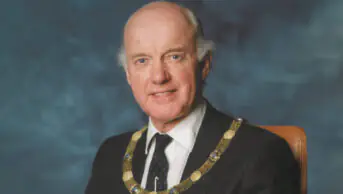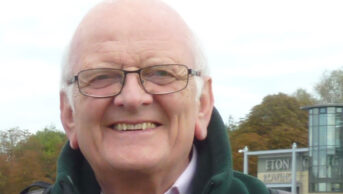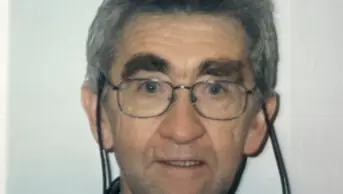Ellis studied pharmacy at Leicester School of Pharmacy and undertook his pre-registration training with Boots, joining the register in 1958. After his National Service in the Royal Army Medical Corps, he returned to pharmacy practice with Boots. In 1961, the United Cambridge Hospitals were recruiting staff in anticipation of the opening of stage 1 of the New Addenbrooke’s Hospital development at Hills Road. He took the opportunity to transfer to the hospital service and was appointed as a pharmacist at Old Addenbrooke’s Trumpington Street — the main unit of the United Cambridge Hospitals. Staff restructuring inherent in the opening of the Outpatient Pharmacy at the new hospital produced a vacancy for the post of Deputy Chief Pharmacist; Sidney John Hopkins, the group’s chief pharmacist, having recognised Ellis’s abilities and potential, appointed him as his deputy at this early point in his career.
I first met Ellis in September 1963 when I joined the staff at Old Addenbrooke’s as a post-graduate student, and was surprised to find that we were of a comparable age. I had done my military service before studying for my pharmacy degree, and though we had been in the RAMC at the same time, our paths had not crossed; though we did have several mutual acquaintances. Ellis was a good mentor and friend to me during my post-graduate year, guiding me in the wide-ranging elements of a teaching hospital pharmacy and, as he was local born and bred, introducing me to aspects of life in Cambridge.
The early 60s was the preclinical era of pharmacy practice, and Ellis’s role as deputy chief saw him responsible for the wide-ranging day-to-day provision of pharmacy services to most of the United Cambridge Hospitals — Addenbrooke’s Trumpington Street, Chesterton Hospital, Maternity Hospital Mill Road, Brookfields Hospital, Douglas House Annexe and the Home of Recovery Hunstanton.
Stage 2 of the Hills Road development, which started in 1968, included space for a large pharmacy; Ellis was involved in advising on the layout and equipment for this unit, which was to become the Central Pharmacy. In 1973, the department moved from Trumpington Street to the newly commissioned Central Pharmacy and, following extensive reorganisation of the NHS and the implementation of the Noel Hall report into hospital pharmacy, Ellis became the principal pharmacist, reporting to Margaret Steane, area pharmacist, who had succeeded Sidney John Hopkins following his retirement in 1972.
Ellis developed good working relationships with senior medical and nursing staff and with other departments and staff at Hills Road. He had a good rapport with his own staff, both at work, where his door was always open, and out on staff social evenings, punting on the Cam (he was skilled with a punt pole), or meals at local pubs and restaurants. He always believed that the training and induction of new staff into hospital pharmacy was a core duty, and I am sure he will be well remembered by the many postgraduate students, junior pharmacists and student technicians who cut their teeth on hospital pharmacy under his guidance.
The Hills Road site continued to grow during the 1970s and 1980s with all the units of the United Cambridge Hospitals eventually moving there. Ellis led an expanding team providing the wide-ranging pharmacy services to support this development. These years saw the start of computerisation, the introduction of clinical pharmacy, resident pharmacy, medicines information, parenteral nutrition and cytotoxic services, and the planning and commissioning of a third new department on the site — the Inpatient Pharmacy. During this time he took the opportunity to develop his own clinical and academic abilities, studying clinical pharmacology back at Leicester School of Pharmacy and obtaining an Open University degree. He also played his part nationally in the Association of Teaching Hospital Pharmacists.
Following further NHS reorganisation and the setting up of the Trust management structure, he was appointed as chief pharmacist at Addenbrooke’s NHS Trust — a post he held until his retirement in 1995.
His career had spanned a period of significant growth and development in the practice of hospital pharmacy. In 1963, the United Cambridge Hospitals had just eight pharmacists and eight support staff, and much of the pharmacists’ time was spent dispensing prescriptions, making up products from their raw materials and issuing stocks to wards and departments — roles now carried out by technicians and support staff. By the time of his retirement, he was leading a team of over 70 people, with most pharmacists involved in clinical work out on the wards, backed up by a range of specialists and technical support staff operating from the three pharmacy departments on the Hills Road site.
Following retirement, he had more time to devote to his many other interests, such as railways, fine wines and fine dining — which could all be conveniently combined in overseas holidays — and horse racing at nearby Newmarket. He was active in his church, serving for several years as church treasurer — a role well suited to his characteristic attention to fine detail. Ellis was a man of strong opinions with a very active mind, and the development of dementia in his final years was difficult for him and his family. The thoughts of his many friends and former colleagues go out to his wife Mary and daughter Fiona and her family following their sad loss.
You may also be interested in

Philip Leon Marshall Davies (1938–2026)

Peter Ian Harrison (1943–2025)
